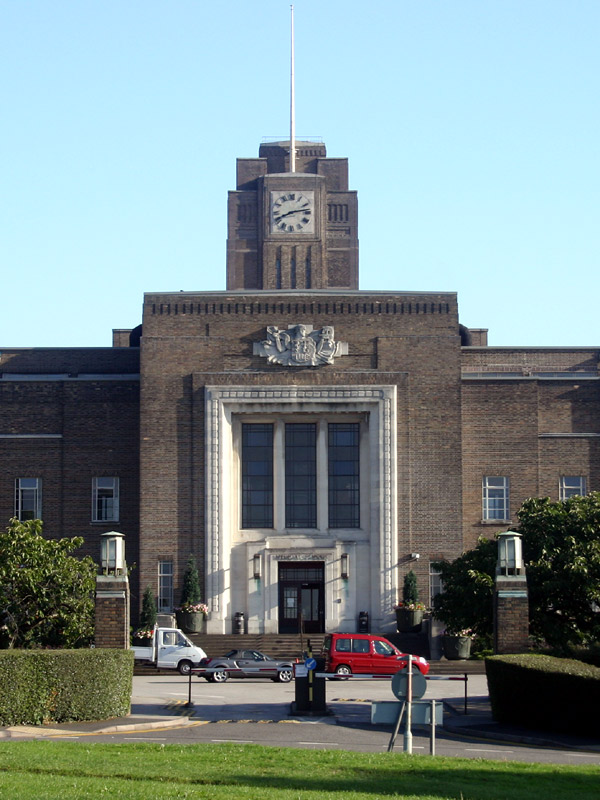- University of Birmingham Medical School
Infobox_University
name =Birmingham Medical School
native_name =
latin_name =
motto =
established =1825
type =Medical school
dean= Prof Ian Booth
free_label =
free =
students =
undergrad =
postgrad =
city =Birmingham
state =
country =United Kingdom
campus =
affiliations =University of Birmingham
website = [http://medweb.bham.ac.uk http://medweb.bham.ac.uk] The University of Birmingham Medical School is one of Britain's largest and oldestmedical school s with a yearly undergraduate intake of about 400 students cite web|url=http://www.study-medicine.co.uk/index.php?pageid=stats|title=www.study-medicine.co.uk British Medical School Statistics|publisher=Study-medicine.co.uk|accessdate=2008-09-08] . It is based at theUniversity of Birmingham inBirmingham ,United Kingdom .History
Birmingham Medical School was founded in 1825 by
William Sands Cox , who began by teaching medical students in his father's house in Birmingham. A new building was used from 1829 (on the site of what is now Snow Hill Station). Students at this time took the licentiate/membership examinations of theRoyal College of Surgeons of England ,Royal College of Surgeons of Edinburgh and theWorshipful Society of Apothecaries .In 1836, Earl Howe and a number of prominent local men submitted a memorial to King William IV and on June 22nd that year, a reply communicated His Majesty’s acquiescence to become a Patron of the School and that it should be styled the Royal School of Medicine and Surgery in Birmingham. That patronage continued when Queen Victoria ascended the throne in 1837. There was serious need for a new teaching hospital and in 1839 an appeal was made. There was sufficient money raised within one year and the hospital was built in 1840-41.
Queen Victoria granted her patronage to the Clinical Hospital in Birmingham and allowed it to be styled "The Queen’s Hospital." In 1841, Queen's Hospital was first opened, byWilliam Sands Cox as a teaching hospital for the medical school. In 1843, the medical school became Queen's College, and students became eligible to be considered for medical degrees awarded by theUniversity of London .A rival medical school, Syndenham College opened in Birmingham in 1851. This merged with Queen's College in 1868 to form a new combined institution, and later merged with another institution,
Mason Science College . In 1897, the Mason University College Act was passed which made Mason Science College (incorporating Queen's College) into aUniversity College , and this, in turn, became Birmingham University in 1900, and MB ChB degrees were able to be awarded by the new university.Janet Parker , the last person to die of smallpox in the world in 1978, contracted the disease while working as medical photographer in the anatomy department.About the Medical School today
The Medical School is now housed within a building on the
University of Birmingham campus in a building constructed in 1938. The Medical School was extended to a design by Scott Wilson and constructed by Architects Design Partnership. The scheme cost £8 million and consisted of a 450 seat lecture theatre and student catering facilities.cite web|url=http://www.scottwilson.com/projects/property/education/university_of_birmingham.aspx |title=University of Birmingham Medical School Wolfson Centre for Medical Education |publisher=Scott Wilson |author=Martin Baugh |accessdate=2008-04-26] The medical is also in the process of constructing a new prosectorium which will cost in the region of £900,000.The undergraduate degree courses running there are the five-year and four-year graduate entry course (GEC) medical degrees (MBChB) and three-year bachelor degrees in medical sciences (BMedSc). The best of the first-class BMedSc graduates each year can possibly begin the four-year MBChB course. An increasingly popular option for medical students is intercalated degrees, in which they complete they take a year out from the MBChB degree to complete a BMedSc degree in a year. The College of Health Sciences at the
University of Zimbabwe was modelled after the Birmingham Medical School. The two hence share and enjoy a special relationship.University of Birmingham students of
dentistry ,nursing andphysiotherapy use the Barnes Library and computer cluster within the medical school building. With the restructure of the university all these schools now come under the umbrella of the College of Health Sciences.References
*cite book|author=J. T. J. Morrison|title=William Sands Cox and the Birmingham Medical School|year=1926|location=Birmingham|publisher=Cornish Brothers
*cite book|author=A. P. Thomson|title=A Short History of the Medical School, Birmingham, The Faculty of Medicine|year=1957|publisher=A. P. Thomson (n.d.) History of the Medical School (as appeared annually in the Faculty Handbook)
*cite book|author=K. D. Wilkinson (ed.)|title=The History of the Birmingham Medical School, 1825-1925|year=1925|location=Birmingham|publisher=Cornish Brothers (Special Number of the Birmingham Medical Review, December 1925)
*R. A. Cohen, "The Birmingham Dental Hospital", Birmingham Medical Review, 1957-58, 20: 331-337; and the lecture notes of the late Dr. B. T. Davis, sometime Assistant Dean, Senior Tutor and Historian of the Medical School
*Weiss MM, et al. (2004). "Rethinking smallpox". Clinical Infectious Disease, 39(11): 1673–1688.External links
* [http://medicine.bham.ac.uk University of Birmingham Medical School website]
* [http://www.medicine.bham.ac.uk/histmed/history.shtml] History of Birmingham Medical School
* [http://www.bham.ac.uk University of Birmingham website]
* [http://medsoc.bham.ac.uk University of Birmingham Medical School Medical Society]
* [http://medsoc.bham.ac.uk/lawsontait/ Lawson Tait Society]
* [http://medweb5.bham.ac.uk/cawc Curriculum and Welfare Committee (CAWC)]
Wikimedia Foundation. 2010.
